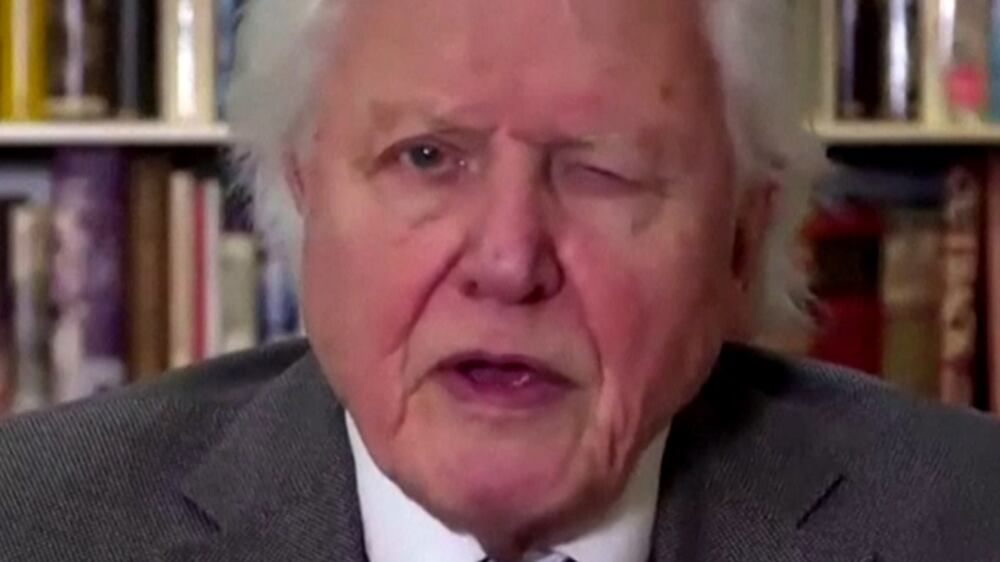America’s new climate czar John Kerry, UK Prime Minister Boris Johnson and the naturalist Sir David Attenborough have appeared at UN talks designed to push climate change up the international agenda as a threat to world peace and security.
The three men were joined by UN Secretary General Antonio Guterres and other world leaders in high-profile UN Security Council talks on Tuesday to warn that man-made climate change was triggering conflicts in the Middle East, Africa, Asia and beyond.
The virtual summit came amid hopes that America’s re-entry into the Paris climate change agreement last week would revive global efforts to cut carbon dioxide emissions by switching out coal, oil and gas for cleaner fuels.
“Climate disruption is a crisis amplifier and multiplier,” Mr Guterres said at the start of talks.
“Where climate change dries up rivers, reduces harvests, destroys critical infrastructure, and displaces communities, it exacerbates the risks of instability and conflict.”
The Red Cross says war-ravaged countries such as Yemen, Mali, Afghanistan, the Democratic Republic of the Congo and Somalia are also among the worst affected by droughts, desertification, water shortages and other problems that make conflict more likely.
A study by the Stockholm International Peace Research Institute, a think tank, found that eight of the ten countries hosting the largest peacekeeping operations lay in regions battered by climate change.
Climate change brings clear risks for international peace and security. UN Peacekeeping is ready to support #ClimateAction. #A4P pic.twitter.com/hLKIWKuGLW
— UN Peacekeeping (@UNPeacekeeping) February 23, 2021
Mr Guterres pointed to Afghanistan, where drought-stricken farmers have been recruited by criminal gangs and extremists, and the arid sub-Sahara belt across Africa, where pastoralists and farmers frequently clash over land and water sources.
“The impacts of this crisis are greatest where fragility and conflicts have weakened coping mechanisms; where people depend on natural capital like forests and fish stocks for their livelihoods,” said Mr Guterres.
Before the talks, Mr Johnson said the UN’s 15-nation body, which typically tackles wars and political crises, should address rising temperatures and other impacts of man-made climate change as threats to world peace.
“From the communities uprooted by extreme weather and hunger, to warlords capitalising on the scramble for resources – a warming planet is driving insecurity,” said Mr Johnson.
Mr Attenborough, the British presenter of The Blue Planet and other hit wildlife shows, pre-recorded a video statement for the meeting. He said mankind could "yet avoid the tipping points that will make runaway climate change unstoppable".
Mr Johnson’s appearance was the first time a British prime minister had chaired Security Council talks in nearly three decades, and the first time leaders had debated climate change at the UN’s top table.
Britain will in November host the Paris agreement’s review conference in Glasgow, known as COP26, to ensure governments are cutting carbon pollution fast enough to stave off the worst effects of global warming.
🇺🇳🇬🇧 Today the UK is bringing together world leaders at the @UN Security Council to discuss the need for urgent climate action
— Foreign, Commonwealth & Development Office (@FCDOGovUK) February 23, 2021
📰 https://t.co/vDf4N0fiEE#COP26 | #TogetherForOurPlanet pic.twitter.com/bw4FuNlwgb
The meeting comes after America’s re-entry on Friday into the Paris Agreement, after US President Joe Biden reversed a 2017 decision by his predecessor, Donald Trump, to exit the pact, calling climate an economy-draining “hoax”.
It also comes amid the latest example of headline-making weather – a winter storm across the southern US that brought deadly freezing winds, snow and ice to areas that seldom see such frigid conditions.
Mr Biden has pledged to put the US on a track to net-zero emissions by 2050 to match the swift and steep global cuts that climatologists say are needed to avoid the worst impacts of global warming, using curbs on fossil fuels and investments in clean energy.
Countries producing two-thirds of global carbon emissions are now pursuing the goal of carbon neutrality by 2050, the UN says. China, the world’s biggest polluter, aims to be carbon neutral by 2060.
Under the 2015 Paris Agreement, most world governments have pledged to keep global warming to “well below” 2°C above pre-industrial times and to strive to limit temperature rises to 1.5°C.
The planet has so far warmed by 1.2°C and is headed for at least 3°C this century – raising the risk of wildfires, droughts, floods, hurricanes and other extreme weather that can drive conflicts over scarce natural resources.
Powerful UN members Russia and China have typically sought to curtail Security Council debate on climate change, but this may change as the environment is increasingly a priority for Beijing.






